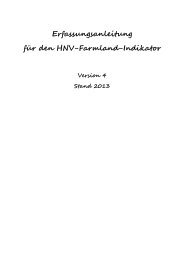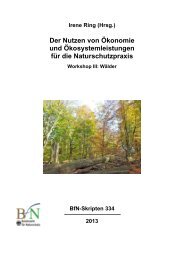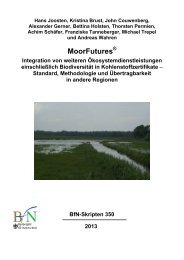Caring for Pollinators - Bundesamt für Naturschutz
Caring for Pollinators - Bundesamt für Naturschutz
Caring for Pollinators - Bundesamt für Naturschutz
Create successful ePaper yourself
Turn your PDF publications into a flip-book with our unique Google optimized e-Paper software.
Roubik Small bees have a big job<br />
2.3 Small bees have a big job - holding up biome biodiversity<br />
by David W. Roubik, Panama<br />
Open habitats are tree graveyards. Their shade, wood, fruit, flowers and seeds have been<br />
replaced by a different set of species, obviously including humans, with their domesticated<br />
and associate organisms. While ‘Homo consumatus’ appropriates landscapes and<br />
subsequently thrives, the benefits of growing many kinds of plants and having natural<br />
reservoirs of pollinators to service them has become a subject of considerable concern.<br />
Which pollinators are important, and how does what we require complement or conflict with<br />
their biology? One resounding successs has been the mobilization of plants and certain<br />
pollinators, those we have learned to keep in mobile pollination units, throughout the globe.<br />
The flaws in this technique are the gaps in our practical knowledge of biology―both of crops<br />
and pollinators―and our inadequate understanding of their limits and susceptibilities. Many<br />
of the fruits of our collective labors are tropical, and much of their continued existence is a<br />
mystery, or attributable to blind luck. A science of pollination ecology and the awareness of<br />
what pollinates these crops and how these animals live, particularly in the tropics of the<br />
world, is the theme of this presentation. Our ef<strong>for</strong>ts to insure pollination through the use of<br />
exotic species, like the honey bee Apis mellifera, which has become invasive in much of the<br />
world, may result in either failure or success. The many other organisms that either were the<br />
original pollinators, or that continue to per<strong>for</strong>m their services, unappreciated, are themes that<br />
should be <strong>for</strong>emost in future ef<strong>for</strong>ts to understand and guarantee continued pollination<br />
services. The alternative, largely to continue the status quo, is untenable.<br />
A tree graveyard, “woodhenge”?<br />
26

















